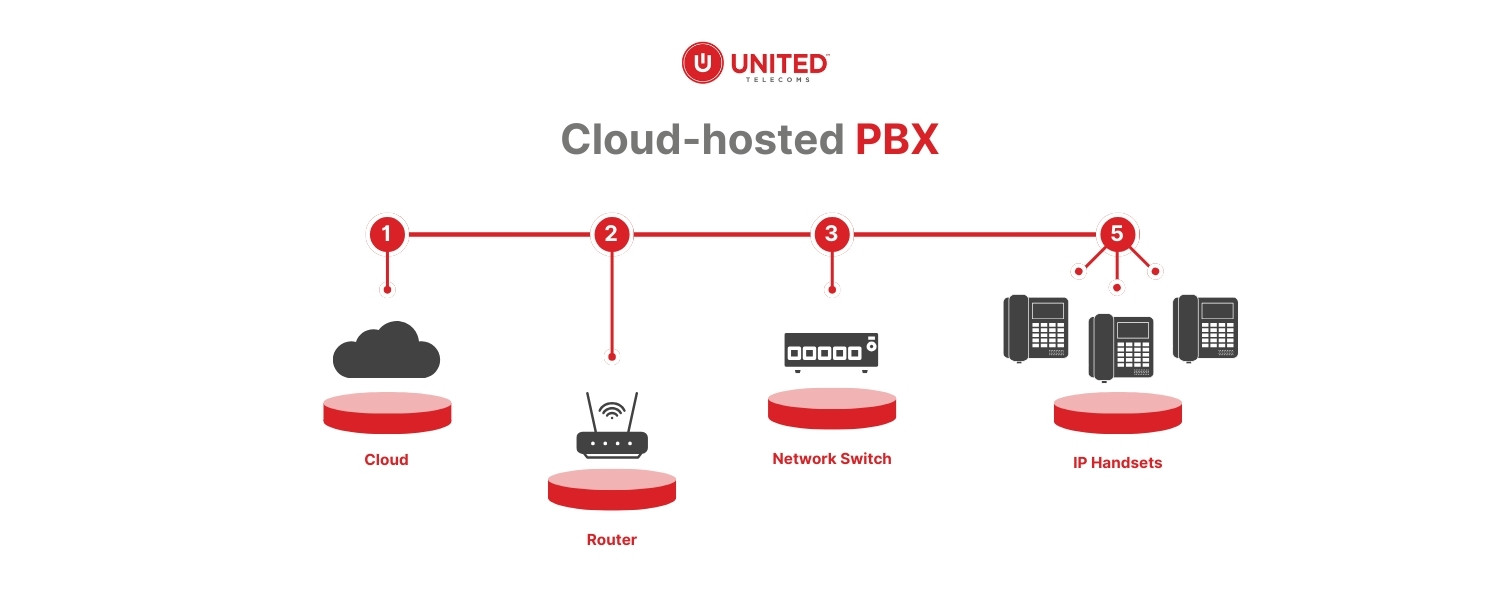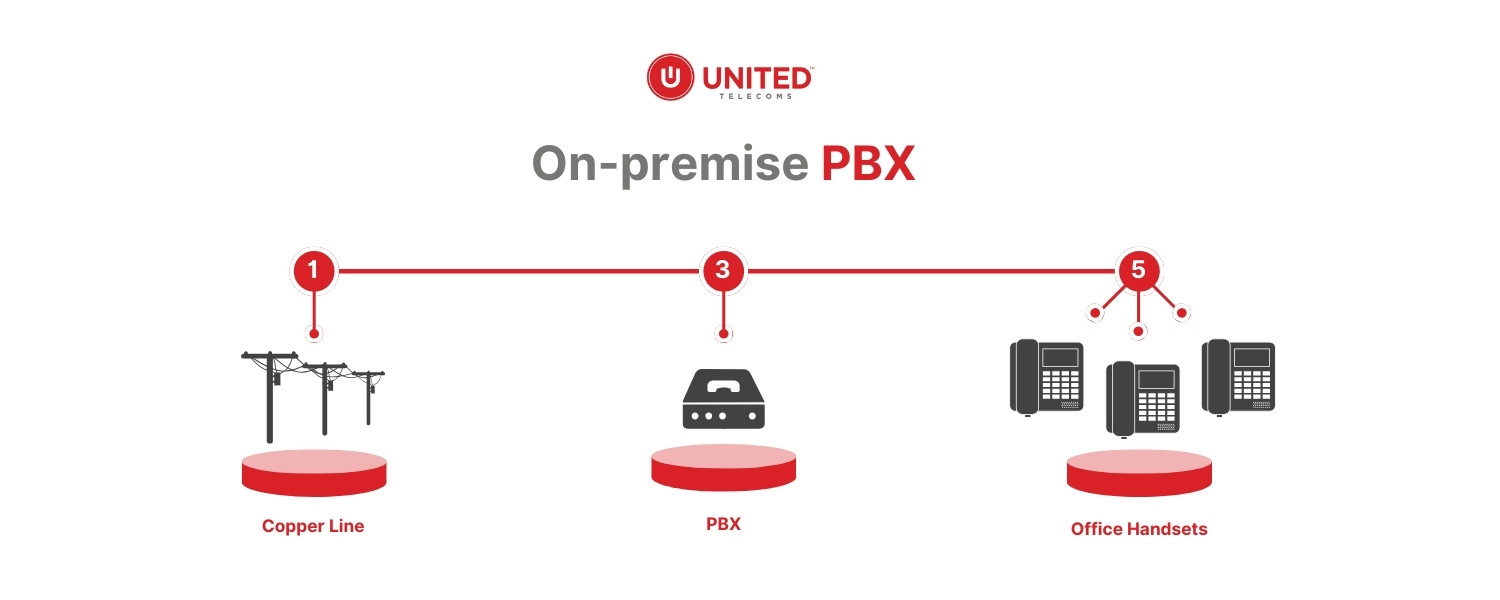Cloud Hosted PBX Systems, On-premise PBX Resources
On-premise Phone System vs Cloud PBX: 7 Key Differences
Traditional PBX systems were the backbone of businesses for decades, facilitating internal and external communications between employees and customers and relying on copper landlines. Over the last decade, cloud PBX systems have seen a rise in adoption due to the benefits they offer including cost savings, a fleet of useful features and minimal hardware requirements.
Today, businesses in South Africa have the choice between analogue, hybrid and cloud PBX systems. In this article, we’ll be distinguishing between two types of PBX systems: cloud PBX and on-premise analogue PBX systems, each offering distinct advantages and considerations for businesses.
Read on to learn more about hosted PBX vs traditional PBX systems.
Key takeaways:
- Cloud PBX is hosted off-site and provides businesses with a cost-effective, highly scalable, and flexible solution with many features and integrations.
- On-premise PBX systems are located and managed on-site, which presents advantages in terms of security and customisability but drawbacks in terms of hardware reliance and resource requirements.
- When choosing between a hosted vs on-premise phone system, it’s recommended to consult with a telecommunications expert, as the best fit for your business may depend on your unique needs and industry.
Table of contents:
- Understanding Cloud-hosted PBX
- Understanding On-premise PBX
- Exploring 7 Key Differences Between Cloud and On-premise PBX
- Final Thoughts on Cloud PBX vs On-premise PBX Systems
Understanding Cloud-hosted PBX
Cloud-hosted PBX systems operate via secure internet connections and are managed off-site by a service provider. This model reduces the need for physical hardware on business premises, allowing for a cleaner setup and easier management.
Key benefits of cloud PBX systems include reduced maintenance costs, enhanced scalability, access to a range of communication features to personalize your solution to your businesses needs and integrations, and seamless management.
Despite these advantages, potential drawbacks of a virtual phone system include reliance on a stable internet connection and possible concerns over data security, given the remote management of communication services.

Understanding On-premise PBX
An on-premises PBX telephone system is installed at a company’s physical location, offering full control over the telecommunications infrastructure. This traditional approach to a business phone system requires significant initial investment in equipment and installation, as well as legacy voice connection methods such as analogue lines and integration with the public switched telephone network (PSTN).
The benefits of an on-premise private branch exchange include complete control over security protocols and customisation to specific business needs.
However, challenges include higher setup costs and running costs, more complex installation requirements and scalability and the need for on-site maintenance and troubleshooting.

Exploring 7 Key Differences Between On-premise Phone System vs Cloud PBX
Choosing the right PBX system is critical for any business, as it affects not only communication efficiency but also operational flexibility.
Understanding the key differences between cloud PBX and on-premises PBX systems is essential for making an informed decision.
Below, we will delve into aspects including cost, scalability, maintenance, and more, providing insights into how each system aligns with different business needs and environments.

1. Cost Implications: Initial setup & monthly expenses
Choosing between cloud and on-premise PBX systems involves several key cost considerations.
Cloud PBX typically involves lower initial setup costs since it requires minimal physical infrastructure, making it cost-effective for businesses with limited capital.
We’ve covered all of the cost considerations for cloud PBX in a related post, but here is a quick recap: Core cost factors for cloud PBX include a reliable internet connection, paying for a set number of extensions based on your team size, and taking your usage into account to purchase an appropriate plan. Additional considerations may include IP phones, softphone extensions, advanced features to suit your communication needs, and once-off landline number porting.
On-premise PBX systems usually require a higher initial investment in equipment and installation costs. To avoid this high initial investment, some companies may opt to rent their equipment to reduce the initial capital outlay. While this will reduce the initial investment, it does result in a recurring cost for on-premise PBX.
Additionally, on-premise PBX systems require all equipment to be hosted on company property.
Therefore, space will need to be allocated, and there are likely to be costs associated with maintenance and upgrades, often carried out by a dedicated in-house team or by your provider’s team. These considerations have various implications in terms of costs and resources.

2. Scalability: Online vs. physical phone system expansion
Scalability is a critical factor when choosing a PBX system. A hosted PBX solution offers exceptional scalability advantages, allowing businesses to add or remove extensions and services within a few clicks by using an application or web portal.
In addition, cloud-based packages often include remote support services to assist you when you scale your system for a smoother experience. The flexibility that a cloud-based system provides is perfect for growing businesses or those with fluctuating needs.
On the other hand, scaling an on-premises PBX can be cumbersome and expensive, often requiring physical hardware additions and customisations. This can include additional cabling and physical rewiring, purchasing more handsets, and purchasing phone lines in modules to support more

3. Maintenance and Upgrades: Remote vs. on-site assistance
A cloud-based PBX system is maintained and upgraded by the service provider. This is usually included as part of your package. This remote management ensures that your cloud solution is always up-to-date with the latest features and security patches, with minimal downtime for the business as well as minimal input from the business.
In contrast, on-premise PBX systems require on-site technical support for maintenance and hardware upgrades. This can lead to operational disruptions and additional labour and parts fees. Larger businesses with on-premise systems may also need IT staff with the expertise to manage complex PBX systems on an ongoing basis and in case of emergency to avoid extended periods of downtime.

4. System Control and Customisation: Tailoring a solution to your business needs
With an on-premise PBX system, businesses enjoy comprehensive control over their communications system. This control allows for extensive customisation in terms of features, security settings, and integrations with other in-house technologies. However, such systems demand a higher level of expertise to manage and customise effectively.
Since cloud PBX providers often include a variety of plan options, customisability comes down to choosing the correct plan that meets your business needs. Many hosted PBX solutions are also easy to configure to suit your business needs right out of the box, and they usually integrate easily with existing systems and applications. However, some advanced security controls and configurations may need to be queried with a provider directly as they may not be included in standard plans.

5. Security and Compliance: Keeping up with data protection standards
Security and compliance are paramount in any business communication system.
On-premise PBX systems allow companies to directly manage their security policies and hardware. Since the end-user has more control over the system, all the data and settings are in their hands. This level of customisation makes it easy to adjust on-premise systems to specific encryption, authentication, and access control needs and provides more visibility over data. However, they may also be considered a single point of failure, meaning your entire PBX telephone system may stop working if one part fails and could take a long time to fix, especially if a malicious actor caused the outage.
Cloud PBX solutions are generally managed by vendors who ensure the systems adhere to the latest security standards and compliance regulations. This means choosing the right provider is essential for ensuring the proper encryption and authentication practices are followed. With that being said, you can address these data security concerns by using a firewall and putting user access settings in place. These will ensure your data is kept safe and will help you maintain POPIA compliance.
Some integration options for cloud PBX solutions may offer additional tools such as fraud detection, recovery routing, real-time alerts, and improved data transparency – further improving security and alignment with compliance standards. There are also integrations like Call Cabinet that can provide businesses with features like compliant call recording or enterprise-grade security.

6. Reliability and Performance: Avoiding downtime for improved experiences
Reliability and performance are crucial for maintaining business communications without interruptions.
Hosted PBX systems offer excellent reliability as long as you have a provider that maintains uptime and has redundancies in place.
In addition, the reliability of your cloud PBX is also influenced by your internet connection. It is important to ensure you have a reliable internet connection with enough bandwidth to support your usage. It may also be useful to implement an internet failover solution (such as a fibre failover system) to ensure your internet connection remains up during any disruptions.
An on-premise system is dependent on in-house management, your landline, and your internet service (if you’re using a hybrid PBX system). While on-premise systems may provide more consistent performance in regions with unreliable internet service, the responsibility to maintain and troubleshoot the system falls on the business, requiring robust IT support. If any issues occur, manual maintenance from a skilled in-house team or call-outs will be required which may result in longer downtime. On-premise PBX systems are also vulnerable to issues such as wear and tear and power outages as a result of the use of the traditional phone lines that are used to transfer phone calls.
7. Integration and Compatibility: Ease of integration with existing technology
Integration capabilities play a significant role in choosing between cloud and on-premise PBX systems, especially as businesses increasingly rely on hardware and software solutions that require an internet connection.
Cloud PBX systems excel in integrating with a variety of modern business applications and platforms, including CRM systems and email, facilitating efficient workflows and unified communications. They can also provide seamless connectivity across mobile devices and other devices and are more adaptive to new technologies, which is crucial for businesses looking to leverage the latest tools and advance with technology.
On the other hand, on-premise systems provide robust integration but may require additional resources to align with newer internet protocol technologies or custom-built solutions. This can make it harder to keep up with advancements in phone system technology and integration into existing setups. It can also result in significant costs for businesses that do try to keep up, as upgrading an on-premise system to work fluidly with the latest business communication tools may involve significant investment.

Final Thoughts on Cloud PBX vs On-premise PBX Systems
In summarising the differences between on-premise and cloud PBX systems, it’s clear that each has its own set of advantages and challenges to consider.
Cloud phone systems, particularly hosted PBX systems, are fast gaining popularity as the preferred modern telephone solution for many businesses throughout South Africa. They are suited for businesses seeking minimal initial investment as well as improved flexibility and ease of management.
On the other hand, on-premise PBX systems are suited to companies with a bigger budget and require much higher control and customisation over their PBX systems. The decision between cloud PBX and on-premise PBX systems must be based on careful assessment of a business’s specific communication needs, growth expectations, and budget constraints.
Consult with United Telecom’s specialists today so we can provide deeper insights and help you find a business phone system that is tailored to your specific needs.








Got questions? Contact our experts today.
We service the following locations in South Africa
Western Cape: Cape Town, Belville, Paarl, Stellenbosch, Somerset West, Vredendal, Hout Bay, Green Point, Bloubergstrand, Durbanville, Melkbosstrand.
Eastern Cape: Port Elizabeth, Knysna, East London, George.
Kwa-Zulu Natal: Durban, Pinetown, Ladysmith, Newcastle, Ballito, Port Shepstone, Pietermaritzburg, Umhlanga, Westville, Hillcrest, Amanzimtoti.
Gauteng: Johannesburg, Vereeniging/Vaal, Sandton, Midrand, Pretoria, Centurion, Randburg, Roodepoort, Germiston, Alberton, Edenvale, Menlo Park.
Free State: Bloemfontein, Welkom, Bethlehem.
Mpumalanga: Witbank, Nelspruit.
Northern Cape: De Aar, Kimberley, Repra (Upington Area).
North West: Klerksdorp, Mafikeng.
Limpopo: Phalaborwa, Polokwane/Pietersburg.
Outside South Africa: Botswana, Zimbabwe, Swaziland, Namibia, Mozambique.
What Our Customers Say
“Once we approved the installations we were kept up to date daily with the levels of progress on our various sites and were very impressed with the final installation”
Spear Properties
Get In Touch
Head Office
19 Trinity Close
Cambridge Commercial Park
Paulshof
Sandton
Tel: 086 001 8500
Email: info@unitedtelecoms.net
6 Edison Way
Century City
Cape Town
Tel: 086 001 8500
Email: info@unitedtelecoms.net
12 Sookhai Place
Derby Downs Office Park
Westville
Tel: 086 001 8500
Email: info@unitedtelecoms.net
We're the experts so that you don't need to be!
PBX Phone System
Beginner's Guide
Voice & Hosted PBX
Resources
PABX Relocation and
Reinstallation
PBX Phone System
Resources